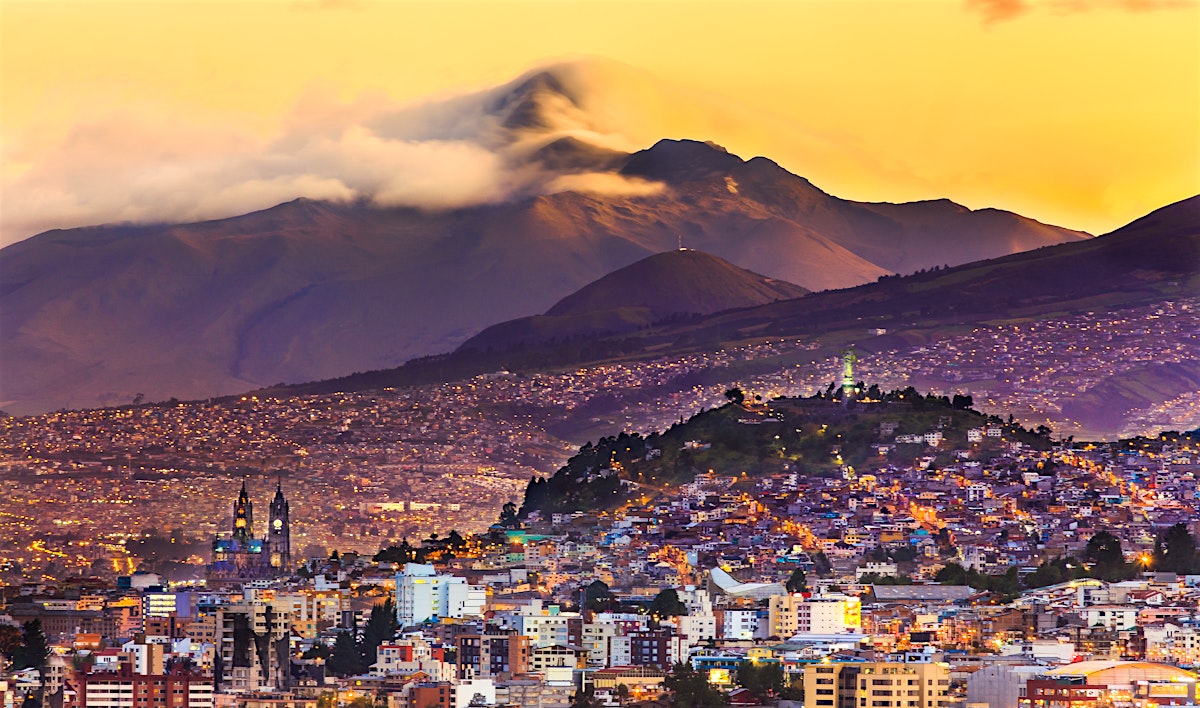Ecuador: Background and History

Quito, Ecuador (Lonely Planet Images)
Located on the west coast of South America, Ecuador lies on the equator and is bordered by Peru, Colombia, and the Pacific Ocean. Home to the Galapagos Islands, Cotopaxi, the tallest active volcano on the planet, as well as sections of the Andes Mountains and the Amazon Rainforest, Ecuador has a variety of distinct climates and is well known for its unique ecology and diverse natural landscape. Ecuador has a population of just over sixteen million people, 71.9 % of which are mestizo. The rest of the population is primarily comprised of Amerindian groups and people of African and European descent.
Ecuador, originally called Quito, formed part of the northern Inca Empire until the Spanish conquest in 1533. In 1563, Quito, became a seat of government for the Spanish colonial empire. In 1717, along with Colombia and Venezuela, Quito became part of the Viceroyalty of New Granada, a jurisdiction of the Spanish Empire, until 1819 when the three territories gained independence from Spain, forming a state called Gran Colombia. Ecuador quickly withdrew from Gran Colombia in 1830, and the República del Ecuador, now commonly known as Ecuador, was founded as an independent nation. After many years of regional fragmentation, conflicts and wars over borders, political instability, including several military dictatorships, and dramatic changes in government, Ecuador became a constitutional democracy in 1979. This constitutional, representative democracy has been maintained since 1979, despite continued political instability and several changes to the constitution. The current president, Rafael Correa, has served as president since 2007.

Ecuador’s Flag (Wikipedia)
The official language of Ecuador is Spanish, but a variety of indigenous languages like Quichua are recognized and widely spoken in certain areas of the country. Over 63% of the Ecuadorian population inhabits urban areas, primarily the capital, Quito, and Guayaquil, a large coastal city. Additionally, 74% percent of the population practices Roman Catholicism, and about another 15% of the population practices other forms of Christianity. The rich Ecuadorian culture is defined by the large mestizo population, meaning that most cultural practices, traditions, and celebrations incorporate aspects of both European and Amerindian cultures.
Currently, Ecuador’s economy is classified as developing and relies on commodities, primarily petroleum exports, which have accounted for over 25% of the public sector revenues for the past several years. Ecuador also exports agricultural products, especially bananas, flowers, and cocoa. In 1999, a banking crisis significantly affected the Ecuadorian economy, increasing poverty dramatically throughout the country. Since 2000, when Ecuador adopted the US dollar as its currency and made many economic reforms, the economy has been growing steadily. However, about 25% of the population continues to live below the poverty line. This rate is much better than it was in the early 2000’s when 40% of the population was estimated to live in poverty, representing significant progress in the last few years. Increased social spending, especially on education and health, has decreased poverty; however, poverty as well as extreme income inequality continues to significantly affect rural, indigenous, and mixed race populations.
Policy Analysis: Reproductive and Sexual Health in Ecuador
This summer I will be working with an NGO in Quito, Ecuador that focuses on providing free or low-cost family planning and related health services to Ecuadorian citizens. The NGO works in 11 provinces of Ecuador to provide reproductive and sexual health services. They operate 26 clinics throughout those 11 provinces, where women can get access to contraception, learn about family planning, and receive gynecological, prenatal, and maternal care. They also work to provide comprehensive sexual education to Ecuadorian communities and spread awareness about reproductive and sexual health topics such as the spread of sexually transmitted diseases and pregnancy prevention.

El Panecillo, Quito, Ecuador (touristeandoecuador.com)
Women throughout Latin America have long struggled for women’s equality and women’s rights. As Ecuador, and most countries in Latin America, are primarily Roman Catholic and relatively conservative, Latin American women have especially faced difficulties in getting access to high-quality sexual and reproductive healthcare. Additionally, the concept of machismo, or strong masculine pride and sense of masculine power and domination, has been a central component of Latin American culture for centuries. A combination of Catholicism and machismo culture has created a stigma around sexual and reproductive health which has a significant influence in policy and government as well as public opinion on the issues. Although there has been significant progress in the last few decades, today, Latin American countries still tend to have some of the strictest laws in the world regarding reproductive and sexual health, especially regarding various forms of birth control and abortion. The vast majority of Latin American countries do not recognize reproductive rights as a human right.
Within this context, Ecuador actually has relatively liberal policy regarding reproductive and sexual rights. After a long campaign fought by the Ecuadorian Women’s Movement, the 1998 Ecuadorian constitution guaranteed sexual and reproductive health rights to all Ecuadorian citizens, designating sexual and reproductive health as fundamental human rights. In comparison to other Latin American countries, this policy is very progressive. No other Latin American country has explicitly guaranteed these rights in their constitution. This constitution also included provisions guaranteeing gender equality in education, healthcare, property rights, and equal rights in the workplace. The Ministry of Public Health has also launched campaigns in the last few years focused on adolescent pregnancy prevention and control of sexually transmitted diseases.

President Rafael Correa (4thmedia.org)
The policies and campaigns regarding sexual and reproductive rights, as well as women’s rights, suggest that the climate surrounding sexuality and reproductive health in Ecuador is changing. At the same time however, President Correa has some of the conservative views and policies regarding women’s rights and women’s health. For example, Correa appointed a pro-life, abstinence-only advocate as the head of the national family planning program. He has also publicly spoken in favor of an abstinence-only approach.
Despite the constitutional recognition of the right to sexual and reproductive health, actually guaranteeing access to sexual and reproductive health to all citizens has remained a challenge for Ecuador. The deep cultural stigmatization of sexual and reproductive health has created barriers against implementation of these policies. This is evident in Ecuador’s maternal and childbirth statistics. The current maternal mortality rate is 110 out of every 100,000 live births. In developed nations, the maternal mortality rate is usually closer to 10-15 deaths out of every 100,000 live births. In addition, Ecuador has the highest rate of teen pregnancy in the Andean region of South America. About 17% of teenage girls aged 15-19 are already moms. Access to safe and legal abortion services is almost nonexistent. These statistics show that although Ecuador has progressive policy regarding this issue, the policy has not been well-implemented and many women are still unable to access affordable sexual and reproductive health services.
Per the constitution, the Ecuadorian government is obligated to guarantee sexual and reproductive rights to all citizens. However, women in Ecuador today face a variety of obstacles that prevent them from exercising their rights, including discrimination, gender inequality, and traditional male-female roles. Despite progressive policy and a shifting attitude towards women’s health and rights, Ecuadorian women today still suffer from high maternal mortality rates, inadequate access to affordable healthcare, a lack of information and education on family planning methods and contraceptives, as well as a lack of easy access to contraceptives.
References:
Acknowledging Sexual and Reproductive Rights in Latin American Constitutions. (n.d.). Retrieved February 01, 2017, from https://rewire.news/article/2008/06/10/ackowledging-sexual-and-reproductive-rights-latin-american-constitutions/
Mora, E. A. (1991). Ecuador since 1930. In L. Bethell (Ed.), The Cambridge History of Latin America: (pp. 687–726). Retrieved from https://www-cambridge-org.ezproxy.rice.edu/core/books/the-cambridge-history-of-latin-america/ecuador-since-1930/01470B5E4EB7A7420BA70DA25269B6D2
Sexual Health as a Human Right: Ecuador’s Unique Model. (n.d.). Retrieved February 01, 2017, from https://www.cfhi.org/sexual-health-as-a-human-right-ecuadors-unique-model
The Struggle for Abortion Rights in Ecuador. (n.d.). Retrieved February 01, 2017, from https://rewire.news/article/2013/04/04/the-struggle-for-abortion-rights-in-ecuador/
The World Factbook: ECUADOR. (2017, January 12). Retrieved January 30, 2017, from https://www.cia.gov/library/publications/the-world-factbook/geos/ec.html







